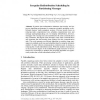Free Online Productivity Tools
i2Speak
i2Symbol
i2OCR
iTex2Img
iWeb2Print
iWeb2Shot
i2Type
iPdf2Split
iPdf2Merge
i2Bopomofo
i2Arabic
i2Style
i2Image
i2PDF
iLatex2Rtf
Sci2ools
108
click to vote
APCSAC
2005
IEEE
2005
IEEE
Irregular Redistribution Scheduling by Partitioning Messages
Abstract. Dynamic data redistribution enhances data locality and improves algorithm performance for numerous scientific problems on distributed memory multi-computers systems. Previous results focus on reducing index computational cost, schedule computational cost, and message packing/unpacking cost. In irregular redistribution, however, messages with varying sizes are transmitted in the same communication step. Therefore, the largest sized messages in the same communication step dominate the data transfer time required for this communication step. This work presents an efficient algorithm to partition large messages into multiple small ones and schedules them by using the minimum number of steps without communication contention and, in doing so, reducing the overall redistribution time. When the number of processors or the maximum degree of the redistribution graph increases or the selected size of messages is medium, the proposed algorithm can significantly reduce the overall redistr...
| Added | 24 Jun 2010 |
| Updated | 24 Jun 2010 |
| Type | Conference |
| Year | 2005 |
| Where | APCSAC |
| Authors | Chang Yu, Ching-Hsien Hsu, Kun-Ming Yu, Chiu-Kuo Liang, Chun-I Chen |
Comments (0)

